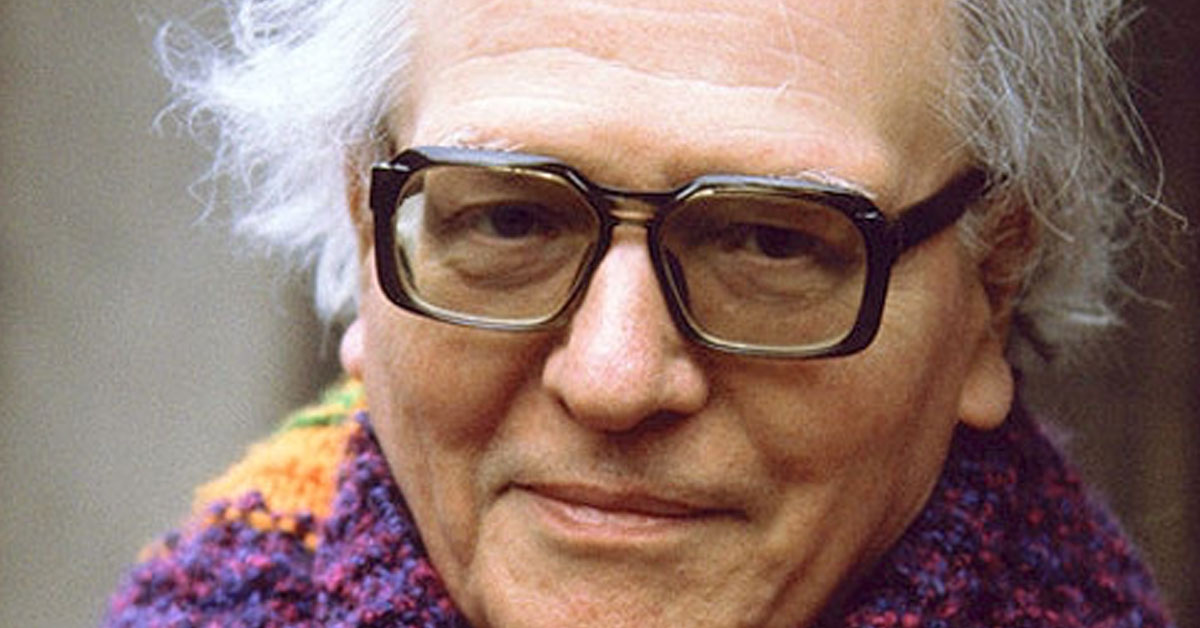Léonie Sonning Music Prize 1977
The French composer Olivier Messiaen received the Léonie Sonning Music Prize of 100,000 Danish kroner at a concert on 26 May 1977 at the Radio House Concert Hall. The concert was broadcast live on the Danish Broadcasting Corporation’s P1 radio channel. In connection with the prize concert, the corporation made a television portrait of Messiaen and his music.
The prize was presented by the Danish Broadcasting Corporation’s Head of Music, Mogens Andersen, who commented in his speech that in his music, Messiaen unites originality with the highest level of perfection. He also emphasized the importance of Messiaen’s work on the contemporary music scene in Denmark, since the composer’s first visit to the country in 1951.
citation
The Léonie Sonning Music Prize is awarded to the composer Olivier Messiaen in recognition of his pioneering significance in the development of art music and in admiration for his works that unify deep originality with the highest artistic perfection
In his speech of thanks, Messiaen replied that he was moved to be the fourteenth recipient of the Music Prize after Stravinsky. He thanked everyone who had helped propagate his music in Denmark, and cited Hans Christian Andersen’s Ole Lukøje, where wonderful adventures are dreamed: ‘in La Transfiguration de Notre Seigneur Jésus-Christ, you experience not just an adventure or even a dream, but a real mystery and a great truth. The meditation on this has filled me with joys and colours. My last thank you is therefore a wish that everyone who is here will have the same experience,’ he concluded.
The programme
Messiaen Méditation V, from Méditations sur le Mystère de la Sainte Trinité
Messiaen La Transfiguration de Notre Seigneur Jésus-Christ
Yvonne Loriod, piano
Charly Olsen, organ
Erling Bløndal Bengtsson, cello
The Danish National Choir
The Danish National Symphony Orchestra
Conductor: Miltiades Caridis
Messiaen in Denmark
In connection with the awarding of the prize, the book Messiaen: Et Håndbog was published, written by Poul Borum and Erik Christensen with support from the Léonie Sonning Music Foundation. At various other concerts in 1977, the Danish Broadcasting Corporation presented a number of Messiaen’s major works including the Turangalîla Symphony conducted by Charles Schwartz and with Pierre-Laurent Aimard as piano soloist, and Oiseaux Exotiques conducted by Václav Neumann and with Erik Kaltoft as soloist.
In the days leading up to the prize concert, events included a dinner at Copenhagen City Hall attended by Danish composers, musicians, conductors and others as well as a speech by the chairman of the Copenhagen Citizens’ Board, Gerda Louw Larsen. Music by Messiaen was performed at concerts in Aarhus (works for piano and voice, performed by Dorthe Steengard and Erik Kaltoft), in Roskilde and Copenhagen Cathedrals (organist Viggo Kanding, who played La Nativité du Seigneur) and in Our Saviour’s Church in Copenhagen, where Flemming Dreisig and Charley Olsen played, among other works, L’Ascension.
The day after the prize concert, Messiaen gave a lecture in the ballroom of the Royal Danish Academy of Music and analysed La Transfiguration de Notre Seigneur Jésus-Christ. At the academy, a chamber concert was also held with works by Messiaen including Le Merle noir, Quartet pour le fin de Temps and Visions de l’Amen. In the evening, Messiaen’s wife, the pianist Yvonne Loriod, played a concert at the academy which included her husband’s piano works, among them excerpts from Vingt Regards sue l’Enfant-Jesus. Messiaen attended all the concerts that took place in his honour and, at his own request, participated in all the rehearsals for the prize concert with the Danish National Symphony Orchestra.
The daily press
The main work was Messiaen’s La Transfiguration de Notre Seigneur Jésus-Christ. […]. The piece takes an extraordinary form. As a great counterpart to Stravinsky’s ascetic Symphony of Psalms from the 1980s, it is conceived as an obsession with mystery and has similar power in its strange union of doubt, blind faith and the greatest artist expression. Though long, it leaves a lasting impression. And though troubling in its devotion to religious wonder, seeming intrinsically absurd to me, it seems to come from a place of deep conviction. Hearing it is akin to a medieval experience, like looking through the stained-glass windows of a gothic church. It was thus an evening in honour of a great composer but also an honour too to the music department of the Danish Broadcasting Corporation, who overcame mountains of technical problems to allow us to go the spiritual distance. A great artists like this raises the bar and offers new perspectives, with great music the result.
(Robert Naur, Politiken, 28 May 1977)
[La Transfiguration] is at once both complicated and very simple. In spite of the ingenious Catholic symbolism, the complicated rhythm and the intricate polyphony, one immediately sensed something emotional and fiercely visionary.
(Thomas Viggo Pedersen, Kristeligt Dagblad, 1 June 1977





